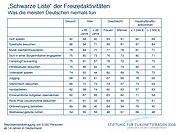Current research, 207
29. July 2008
BAT Foundation for Future Studies publishes new study on leisure behaviour in Germany
The “blacklist“ of leisure activities
What most Germans never do
Watching television, making phone calls, listening to the radio and reading the newspaper have been among the most popular leisure activities for Germans for decades. But what are the leisure activities that Germans never do? For the first time, the British American Tobacco Foundation for Future Studies has presented a „Black Top 10 List“ of leisure activities that are never practised. A representative sample of 3,000 people aged 14 and over were asked how often they engage in which leisure activities. The nine-point scale ranged from „every day“ to „never“.
The majority of Germans honestly admit to never practising a number of ‚seemingly„ popular activities such as golf (92%), wellness (54%) or camping (75%). Going to amusement arcades (86%), music concerts (61%) or gyms (75%) is just as rare for most Germans as jogging (68%) or making music (78%). Despite the computer age, online shopping (59%) and video games (74%) must also be viewed realistically, which remain just as unnoticed as regulars“ table visits (66%) and handicrafts (62%). These results are only surprising at first glance: „The ageing of German society and the unresolved economic problems are increasingly having an impact on leisure activities,“ says Professor Dr Horst W. Opaschowski, Scientific Director of the BAT Foundation. "With increasing age, active leisure activities outside the home gradually decrease and passive activities within the home increase. In addition, more and more Germans have to save on their leisure budgets and can no longer afford many activities," the scientist continues. The problem for him is the large number of citizens who are not involved in voluntary work: Almost two thirds of Germans (62%) never do any voluntary work.
The Hamburg Foundation for Future Studies predicts a two-part picture for the future of leisure activities: on the one hand, the older and poorer sections of the population in Germany will characterise many leisure activities in Germany. The main beneficiaries of this will be the media and low-cost leisure activities. On the other hand, Germans do not want to be passive in the long term and spend their lives alone at home. Making this possible calls for action: From politicians, who must set the framework conditions, to the leisure industry, which must create cost-effective and target group-orientated leisure activities, to every citizen themselves, who must develop more personal initiative.
Research information
The new comprehensive data volume „Freizeit-Monitor 2007/08“ contains - listed according to socio-demographic characteristics such as gender, age, education, income, stage of life, etc. - detailed information on 80 different leisure activities ranging from television and PCs, museums and theatre to voluntary work in churches, political parties, trade unions or clubs.
The study was based on a representative survey of 3,000 people aged 14 and over.
The data volume „Freizeit-Monitor 2007/08“ is now available as a study or CD-ROM for a nominal fee of 98.00 euros.



